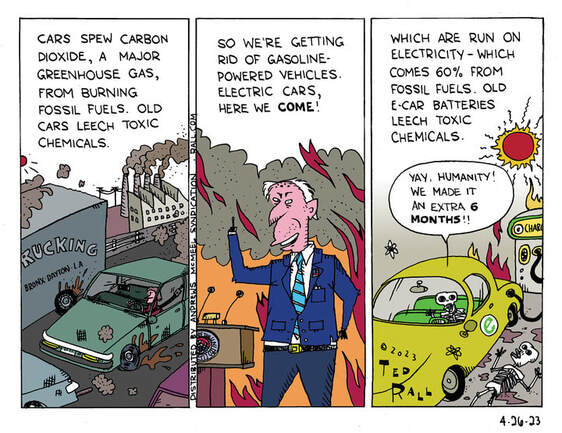Electric Cars Won't Make Our World a Better Place
an open letter to Malcolm Gladwell - who LOVES cars!

Acknowledging how much revisionist historian Malcolm Gladwell (and most North Americans) LOVE the autonomy and speed of automobiles, I submit that electric vehicles are just as bad for Earth's environment as those powered by gasoline.
1. EACH CAR REQUIRES TOO MANY RESOURCES, DOES TOO MUCH DAMAGE GETTING THEM.
Think not only of "carbon footprint," but the total Earth-to-Earth impact of every single car that is made.
Each individual vehicle digs into global supplies of steel, oil/plastic, acids, paint, rubber, lead, fiddly computer bits like lithium, and so on. Currently, we put few of these resources back in useable form. (Check out what Tesla discharges into the Santiago River near Guadalajara, Mexico, if you can.)1
The machines used for mining these resources, the concrete and machinery used for factories to build cars, all have huge carbon and stripped-earth and chemical impacts which are the same to make every personal transport pod, whatever powers it.
2. ASPHALT AND CONCRETE CAUSE RESOURCE PROBLEMS, TOO.
Do Earth-to-Earth calculations for the asphalt we lay for cars to run on, whether the cars are electric or gasoline or yea, even biogas. With respect to the machinery and damage related to digging and combining the resources to make asphalt and concrete, see above.
In addition to carbon/ chemical/ stripped-earth footprints, asphalt parking lots and concrete parking garages affect the albedo of Earth and add long-wave radiation (= heat) to the atmosphere.
Do Earth-to-Earth calculations for the asphalt we lay for cars to run on, whether the cars are electric or gasoline or yea, even biogas. With respect to the machinery and damage related to digging and combining the resources to make asphalt and concrete, see above.
In addition to carbon/ chemical/ stripped-earth footprints, asphalt parking lots and concrete parking garages affect the albedo of Earth and add long-wave radiation (= heat) to the atmosphere.
For these reasons, I argue that personal transportation pods are a massive environmental problem per se. But what about Electric vs. Gas?
Think about where electricity comes from and how it is stored and transported.
3. LARGE-SCALE SYSTEMS TO MAKE ELECTRICITY CAN BE AS DESTRUCTIVE AS EXTRACTING OIL.
Electricity from water power = dammed rivers = huge masses of concrete plus adverse impacts on indigenous villages that were flooded (ancient history), on fish, eels, bugs, birds, oxygen (present issues), and on water flow.
Electricity from solar power = mining for silica and delicate metals and manufacturing costs, plus albedo effects of huge solar farms.
Electricity from wind power = manufacturing and transportation issues for hundreds of massive machines, plus the cooptation of acres of land for wind farms.
Electricity from nuclear power plants? Electricity from super-polluting operations like the "slew of coal-fired power plants, from FirstEnergy’s Harrison in West Virginia to Conemaugh in Pennsylvania, owned by companies including NRG Energy and PSEG."? 2
Granted, the European Union acknowledges electricity-production problems and several nations are trying to develop "circular economies" for energy. But what about the Americas? What about the Asians? What about wealthy Arab states?
Electricity from water power = dammed rivers = huge masses of concrete plus adverse impacts on indigenous villages that were flooded (ancient history), on fish, eels, bugs, birds, oxygen (present issues), and on water flow.
Electricity from solar power = mining for silica and delicate metals and manufacturing costs, plus albedo effects of huge solar farms.
Electricity from wind power = manufacturing and transportation issues for hundreds of massive machines, plus the cooptation of acres of land for wind farms.
Electricity from nuclear power plants? Electricity from super-polluting operations like the "slew of coal-fired power plants, from FirstEnergy’s Harrison in West Virginia to Conemaugh in Pennsylvania, owned by companies including NRG Energy and PSEG."? 2
Granted, the European Union acknowledges electricity-production problems and several nations are trying to develop "circular economies" for energy. But what about the Americas? What about the Asians? What about wealthy Arab states?
4. AND DON'T FORGET ELECTRICITY IS STORED IN BATTERIES, TRANSPORTED THROUGH TOWERS AND WIRES AND CABLES.
Whenever electricity is generated, it is stored in batteries. This is true in electric cars, on boats, in power plants. Do I need to list the Earth-to-Earth problems with a battery in terms of rare and common metals, acids, etc. in its construction? Do I need to summarize what is happening on Earth with used batteries?3 Compare the circular economy strategies for batteries in Northern Europe 4 with the realities of battery recycling in, say, Mexico.5 Yes, folks are concerned about this problem, but what is happening on Earth while we wait?
Electricity is transported through wires and towers and cables that take masses of raw and processed materials to make and build and repair. Some people suffer from vibrations emitted by these systems, but perhaps they are too few to concern us.
Whenever electricity is generated, it is stored in batteries. This is true in electric cars, on boats, in power plants. Do I need to list the Earth-to-Earth problems with a battery in terms of rare and common metals, acids, etc. in its construction? Do I need to summarize what is happening on Earth with used batteries?3 Compare the circular economy strategies for batteries in Northern Europe 4 with the realities of battery recycling in, say, Mexico.5 Yes, folks are concerned about this problem, but what is happening on Earth while we wait?
Electricity is transported through wires and towers and cables that take masses of raw and processed materials to make and build and repair. Some people suffer from vibrations emitted by these systems, but perhaps they are too few to concern us.
We have been told that electricity is clean, but its whole life cycle is not clean. Granted, every kind of energy has trade-offs. No transportation system is pure. But moving people around Earth in individual protective pods is very inefficient in its use of resources. Most nations and manufacturers have spent little creativity trying to improve methods of extraction and recycling of materials this private pod system demands. Even the best electric car won't make the world a better place. . . .
|
. . . But public transportation might. We can reimagine systems currently in place to serve more people at less cost—upgrade trains, organize clever ways to ride-share, use roving mini-buses and vans like South Africans and Chileans. Of course we can ride bicycles and walk. Oxcarts? OK, probably not. But we can facilitate a range of options besides personal cars. We can start to take responsibility for the whole Earth.
We need to do it soon. |
PS Planes and rockets are even worse for the Earth in every dimension,
but controlling those will demand more political will than I see on the horizon.
Cartoon graphic by Ted Rall • [email protected]
Used with permission
1. River of Death - Type Investigations / ‘A Slow-Motion Chernobyl’:
How Lax Laws Turned a River Into a Disaster - The New York Times (nytimes.com)
2. https://features.weather.com/superpolluters/
3. Millions of electric cars are coming. What happens to all the dead batteries? | Science | AAAS
4. Norwegian Waste-to-Energy: Climate change, circular economy
and carbon capture and storage - ScienceDirect
5. Lead Exposure From U.S. Car Batteries Threatens Health of Mexican Workers -
The New York Times (nytimes.com) /
Americans’ old car batteries are making Mexican workers sick (sanjuandailystar.com)
but controlling those will demand more political will than I see on the horizon.
Cartoon graphic by Ted Rall • [email protected]
Used with permission
1. River of Death - Type Investigations / ‘A Slow-Motion Chernobyl’:
How Lax Laws Turned a River Into a Disaster - The New York Times (nytimes.com)
2. https://features.weather.com/superpolluters/
3. Millions of electric cars are coming. What happens to all the dead batteries? | Science | AAAS
4. Norwegian Waste-to-Energy: Climate change, circular economy
and carbon capture and storage - ScienceDirect
5. Lead Exposure From U.S. Car Batteries Threatens Health of Mexican Workers -
The New York Times (nytimes.com) /
Americans’ old car batteries are making Mexican workers sick (sanjuandailystar.com)
